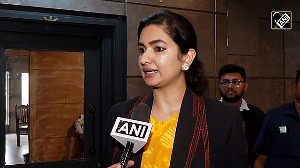At the end of the talks between Pakistani Foreign Secretary Salman Bashir and his Indian counterpart Nirupama Rao in New Delhi on Thursday, the latter projected the initiative taken by India in proposing the meeting between the two countries as a prelude to a wider dialogue at different levels on various contentious issues -- though not necessarily in the form of a reversion to the composite dialogue process to which Pakistan continues to be attached.
Her projection was positive and sought to convey two messages to the Indian audience whom she was addressing. Firstly, India had kept the focus of the meeting largely on terrorism.
There were references to other issues such as Kashmir, the river waters, Pakistani allegations relating to Balochistan etc by the Pakistani foreign secretary, but these references did not detract from the fact that it was a meeting largely about India's expectations of Pakistani action against terrorism.
Secondly, the meeting was the beginning of a process of re-building the trust between the two countries and she kept open the possibility of more such meetings to follow before there was a resumption of formal negotiations between the two countries.
This positive picture which emerged from her media briefing was damaged by the briefing by Bashir in the Pakistani High Commission, which followed about two hours after her briefing. He and his government in Islamabad knew by then the way India sought to project the meeting to its own people and to the international community and they were under an understandable compulsion to convince their people that India had not succeeded in keeping the focus of the meeting largely on terrorism as the Indian Foreign Secretary had claimed and that Pakistan had succeeded in giving the meeting a much larger content by raising various other issues.
In his understandable attempt to convince his own people that Pakistan had frustrated Indian attempts to keep the meeting confined to a single-issue agenda, Bashir used language, which was often sarcastic and dismissive and devoid of the politeness and diplomatic finesse which characterized Rao's media interaction throughout.
He showed a lack of sensitivity to India's concerns on terrorism-related issues except its concern regarding Pakistani action against the Pakistan-based conspirators of the 26/11 terrorist strikes.
His media briefing gave an unmistakable impression that while Pakistan was somewhat serious about action against the 26/11 conspirators in Pakistan, it was not prepared to consider other Indian demands relating to action against Hafeez Mohammad Sayeed, the Amir of the Lashkar-e-Toiba (LET), and the Pakistan-based terrorist infrastructure directed against India. Action in specific cases such as the 26/11 terrorist strikes, yes, but action against the terrorist infrastructure, no. That was his clear message.
The kind of language used by Bashir and his ridiculing of many of Indian concerns relating to terrorism have given rise to two questions -- Was the meeting worthwhile? Is it necessary to follow it up with more such meetings as India had intended?
Bashir's actions are bound to strengthen the arguments of the skeptics in India who believe in the futility of any dialogue with Pakistan and embarrass those who are arguing otherwise. Instead of contributing to a reduction of the trust deficit, he has strengthened it.
The resulting dilemma could be attributed to the over-haste with which the initiative for the meeting was pushed through by the Government of India without wider consultations at the inter and intra-party levels and the failure to work for a certain convergence with Islamabad before the meeting on its format, agenda and the briefing of the media in the two countries even if it was not intended to issue a joint statement.
What we had was one meeting, two agendas, two media briefings disseminating two contradictory versions of what transpired and more confusion and distrust after the meeting than there was before it.
What are the lessons from the unfortunate experience? Lesson No.1: While anxiety for a dialogue with an adversary such as Pakistan is understandable, over-anxiety for a dialogue and over-haste in organising it could be counter-productive.
Lesson.2: Any meeting at any level---political or bureaucratic--- which is not preceded by careful preparations could prove a meaningless exercise.
In spite of what happened at New Delhi on February 25, 2010, P.Chidambaram, our Home Minister, should go ahead with his visit to Islamabad next month to attend the SAARC Home Ministers' conference and his discussions with Rehman Malik, his Pakistani counterpart, in the margins of the conference to work out a modicum of a mechanism for mutual legal assistance in all criminal cases, including those relating to terrorism.
If he succeeds, that could pave the way for a fruitful visit by our foreign secretary to Pakistan in response to the invitation extended by Bashir.
In the meanwhile, it is important for Prime Minister Dr Manmohan Singh to initiate a process of wider political consultations on our relations with Pakistan in order to convince other political parties that the government would not sacrifice our core concerns on Pakistan's continued use of terrorism against India to force a change in the status quo in Kashmir while re-starting the dialogue process.
His tendency to maintain unwarranted secrecy in such matters and his habit of avoiding wider consultations continue to give rise to an impression that American interests and perceptions are playing a larger than desirable role in influencing our policies vis-a-vis Pakistan.





